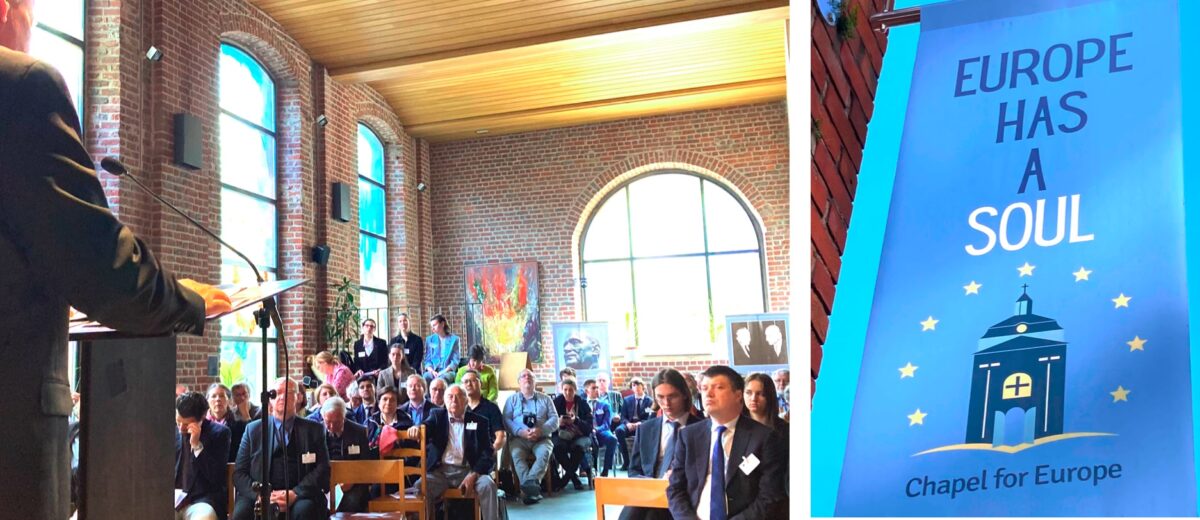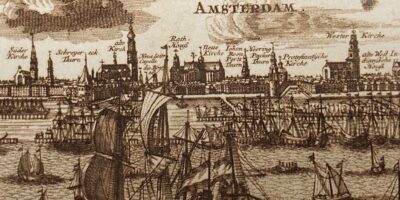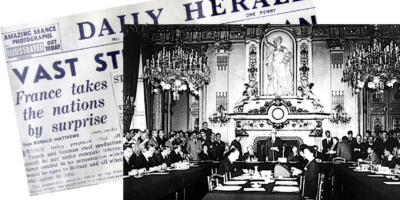Nestled in the valley between the European Union institutions in Brussels is the Chapel for Europe, a reconstructed former convent chapel resurrected as an ecumenical worship space for EU politicians and staff.
The chapel stands as a reminder of the spiritual values the founding fathers of Europe believed were essential for lasting peace in Europe. The banner outside reminds a largely secular community that ‘Europe has a soul’.
On Thursday, the chapel was full with old and young, clergy and lay, Evangelical, Protestant, Catholic and Orthodox, gathered to pray for the renewal of the soul of Europe in the face of today’s threats to peace, freedom, equality and brotherhood.
This prayer event commemorated the 75th anniversary of the Schuman Declaration, announced by the French Foreign Minister Robert Schuman on May 9, 1950 – as did the State of Europe Forum in Warsaw I wrote about last week. Four Christian networks collaborated to highlight the spiritual dimension of the founding document of European integration in Brussels, where the story is usually told only in economic and political terms: Together for Europe, CEC (Conference of European Churches), COMECE (Commission of the Catholic Bishops’ Conferences of the European Union) and the IAO (Interparliamentary Assemby on Orthodoxy).
Earlier on Thursday, the same networks had collaborated to organise an official meeting in the European Parliament building to reflect on the original significance of the Schuman Declaration in the turbulent post-war days, and its significance in our current uncertain times. Several European parliamentarians from ECR, EPP and Green parties contributed perspectives.
Deeper
I was asked to present the keynote talk entitled ‘What lies beneath?’, which I previewed in last week’s Weekly Word. The Schuman Declaration, I suggested, can be read on one level as simply the announcement of a bold economic plan to link the coal and steel industries of former enemies in the European Coal and Steel Communty (ECSC). This would prevent future production of a war machine, coal and steel being essential ingredients for waging war. Yet Schuman warned that the project must not just be economic and technological; it needed a soul.
For read on a deeper level, the Schuman Declaration reveals the project to be rooted in spiritual values of the heart. Without using religious jargon, Schuman infused the declaration with the values of peace, equality, freedom and solidarity. All these were indispensable for the rebuilding of post-war Europe.
The document is saturated with words reflecting such values, beginning with peace, coming together, participation, pooling, common, solidarity, unification, equal, commmunity…
Democracy owed its existence to Christianity, Schuman would later write in his book For Europe, emphasising human dignity, the freedom of each individual, human rights and the practice of brotherly love. Divorced from its Christian roots, he warned, it would degenerate into anarchy or tyranny – a process we see unfolding before our very eyes right now. European unity must be rooted in ‘freedom, equality and solidarity’, which we have drawn from Christian teachings, he wrote.
Real peace, Schuman believed, was not the absence of war, merely a ceasefire, but the active construction of relationships founded on justice and solidarity, through forgiveness and reconciliation. After two world wars, the task of rebuilding Europe required not only new institutions, but a moral renewal, a reawakening of conscience, a rediscovery of human brotherhood.
Prayer retreat
Schuman’s fellow believers, Konrad Adenauer (West Germany) and Alcide de Gasperi (Italy), shared his understanding. Prior to signing the ECSC treaty in Paris, these three men held a prayer retreat in the Maria Laach monastery near Koblenz to ask God’s blessing on the project.
I recounted Adenauer’s words to Schuman after signing the Treaty in April 1951: ‘I consider it providential that the task of rebuilding Europe rests on the shoulders of men like you, our brother de Gasperi and myself who are filled with the desire to build the new edifice of Europe on Christian foundations.’
What a privilege it was to share these stories on this occasion. I found myself wondering how often the spirituality of the Schuman Declaration had been so highlighted in a meeting in the European Parliament building.
Later in the chapel my thoughts went back fifteen years to 2010, when on the 60th anniversary of the Schuman Declaration, and in this same chapel, we launched both the Schuman Centre for European Studies and the first edition of my book on the Schuman story, Deeply Rooted.
Over the years we have held several Schuman Centre events in the chapel, including the Schuman Symposium on Spirituality and Politics on the eve of several European Prayer Breakfasts prior to Covid, and the European Studies Day of last year’s State of Europe Forum in Brussels.
Gratefully I reflected on how that both of Thursday’s events had had their origins in the Schuman Centre’s efforts to highlight the spiritual dimensions of the Schuman story. Gerhard Pross of Together for Europe had initiated these commemorations after reading Als das Neue Europa begann, the German edition of Deeply Rooted. Over these fifteen years, Schuman Centre activities of forums, summer schools, masters courses, study days, weekly words and Schuman Talks have stirred the awareness of ‘what lies beneath’ among many across Europe.
Thanks be to God.
P.S. A special 75th anniversary edition of Deeply Rooted is now available in hard copy. For delivery, whatsapp +31 6 51366669
Till next week,



